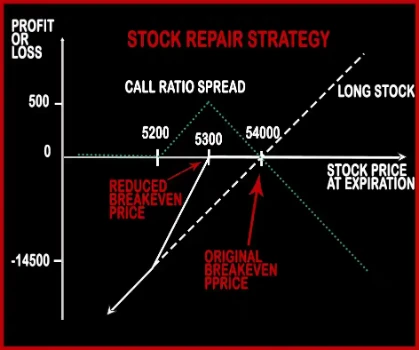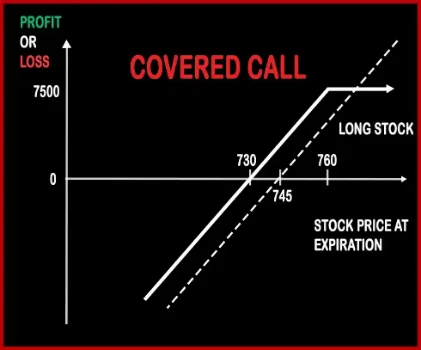Compare Strategies
| STOCK REPAIR | COVERED CALL | |
|---|---|---|

|

|
|
| About Strategy |
Stock Repair Option StrategyStock Repair Strategy is used to cover up for losses made on long stock position. After the long position suffered losses on stock price fall, a trader will implement this strategy in order to bring down the breakeven price and capping his further losses thereby increasing his probability of loss recovery. Suppose Mr. X has |
Covered Call Option StrategyMr. X owns Reliance Shares and expects the price to rise in the near future. Mr. X is entitled to receive dividends for the shares he hold in cash market. Covered Call Strategy involves selling of OTM Call Option of the same underlying asset. The OTM Call Option Strike Price will generally be the price, where Mr. X will look to get out o .. |
STOCK REPAIR Vs COVERED CALL - Details
| STOCK REPAIR | COVERED CALL | |
|---|---|---|
| Market View | Bullish | Bullish |
| Type (CE/PE) | CE (Call Option) | CE (Call Option) |
| Number Of Positions | 3 | 2 |
| Strategy Level | Beginners | Advance |
| Reward Profile | Unlimited | Limited |
| Risk Profile | Limited | Unlimited |
| Breakeven Point | Purchase Price of Underlying- Premium Received |
STOCK REPAIR Vs COVERED CALL - When & How to use ?
| STOCK REPAIR | COVERED CALL | |
|---|---|---|
| Market View | Bullish | Bullish |
| When to use? | Stock Repair Strategy is used to cover up for losses made on long stock position. After the long position suffered losses on stock price fall, a trader will implement this strategy in order to bring down the breakeven price and capping his further losses thereby increasing his probability of loss recovery. | An investor has a short term neutral view on the asset and for this reason holds the asset long and has a short position to generate income. |
| Action | Buy 1 ATM Call, Sell 2 OTM Calls | (Buy Underlying) (Sell OTM Call Option) |
| Breakeven Point | Purchase Price of Underlying- Premium Received |
STOCK REPAIR Vs COVERED CALL - Risk & Reward
| STOCK REPAIR | COVERED CALL | |
|---|---|---|
| Maximum Profit Scenario | [Call Strike Price - Stock Price Paid] + Premium Received | |
| Maximum Loss Scenario | Purchase Price of Underlying - Price of Underlying) + Premium Received | |
| Risk | Limited | Unlimited |
| Reward | Unlimited | Limited |
STOCK REPAIR Vs COVERED CALL - Strategy Pros & Cons
| STOCK REPAIR | COVERED CALL | |
|---|---|---|
| Similar Strategies | Bull Call Spread | |
| Disadvantage | • Management required with all the positions. • Additional loss due to continuous decline in shares as downside risk remains unchanged. | • Unlimited risk, limited reward. • Inability to earn interest on the proceed used to buy the underlying stock. |
| Advantages | • This strategy creates an opportunity to recover losses by lowering our breakeven. • No margin required. • No additional downside risk and costs nothing to put on. | • Profit from option premium, rise in the underlying stock and dividends on the stock. • Allows you to generate income from your holding. • Profit when underlying stock price rise, move sideways or marginal fall. |